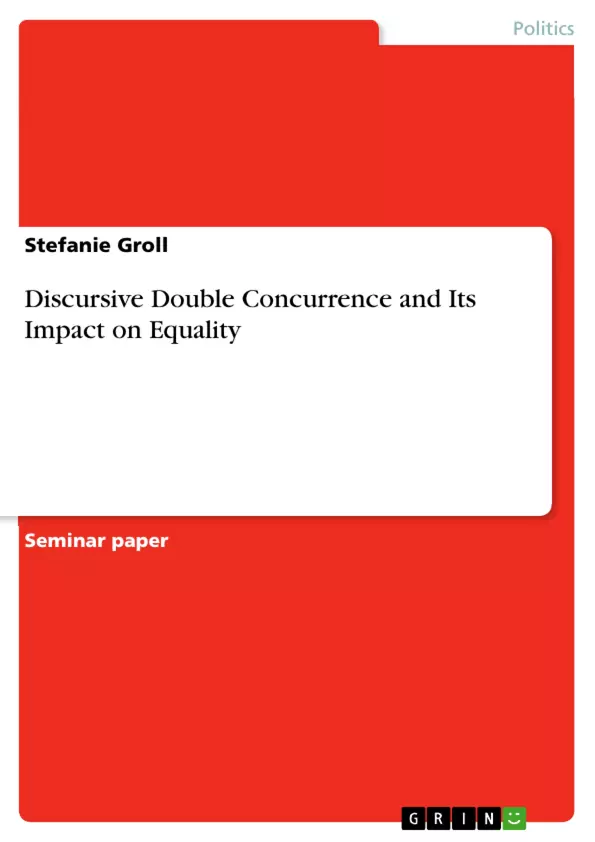In the May issue of the Cicero magazine Eva Herman puts up a provocative question: “Die Emanzipation - ein Irrtum?” Her answer is yes. She finds that feminism has deconstructed typical roles and clichés of women and men. Women have been forced into emancipation, into adapting atypical (male) behaviours, while their natural duty of motherhood is neglected. Torn apart between atypical and typical demands women inevitably fail. Herman’s conclusion is that emancipation is a failure which needs to be reversed. She might deliver sound arguments but the premises she draws upon are stunning. As she declares emancipation a failure she must conceive of it as a completed yet not accomplished endeavour. She degrades female emancipation and equality of genders a hopeless and dysfunctional idea which has proved to be a utopia of feminists. Contemporary feminists, on the other hand, would argue that emancipation is still in progress. As it has not ended yet Herman would be rash and biased in her judgement. Ironically, Herman shares her conviction of a concluded emancipation with others not opposed to it. It is true, however, that feminism as a political position is taking a rest while suspension of equal rights continues. Sexism in all its facets continues. The questions interconnected with this problem are: What hinders women from a discernment of disadvantage towards men? Why does feminism loose political and social agency? Why does the supremacy of the male sex continue? Why do women like Eva Herman encourage persons of the same sex to discard self realization?
Inhaltsverzeichnis (Table of Contents)
- Problem and Question
- Thesis and Theory
- Analysis of the Novel
- Résumé: Our Society..
- Literature
Zielsetzung und Themenschwerpunkte (Objectives and Key Themes)
This paper aims to analyze the concept of discursive double concurrence and its impact on equality, drawing inspiration from Eva Herman's controversial perspective on women's emancipation and Margaret Atwood's dystopian novel "The Handmaid's Tale". The central argument explores how women's struggle for equality is hampered by both male dominance and intra-sexual rivalry, perpetuating systemic inequalities.
- Discursive double concurrence and its impact on women's equality
- Intra-sexual rivalry and its role in perpetuating gender asymmetry
- Analysis of "The Handmaid's Tale" as a case study of discursive double concurrence
- The role of discourse in shaping social identities, power dynamics, and hegemonies
- The interplay of sexuality, fertility, and social control in maintaining a double concurrence society
Zusammenfassung der Kapitel (Chapter Summaries)
- Problem and Question: This chapter introduces the provocative question posed by Eva Herman regarding the failure of female emancipation, highlighting the debate between feminist perspectives and those that critique its impact. It further explores the question of why women seem to struggle to achieve equality, despite ongoing efforts.
- Thesis and Theory: This chapter outlines the central thesis, proposing that the endeavor towards equality is hindered by a system-conditioned "double concurrence" faced by women. It explains how this double concurrence arises from both challenging male hegemony and engaging in intra-sexual rivalry, hindering collective action and perpetuating gender asymmetry. The chapter introduces "The Handmaid's Tale" as a fictional example of this phenomenon.
- Analysis of the Novel: This chapter focuses on a discourse analysis of "The Handmaid's Tale," exploring how the novel illustrates the concept of double concurrence. It examines the specific elements of the novel's discourse – body, status, sexual orientation, rituals, and supervision/punishment – and how they contribute to the creation of a dystopian society characterized by inter-sexual and intra-sexual rivalry. The chapter draws on Michel Foucault's ideas for theoretical support.
Schlüsselwörter (Keywords)
This paper explores the concepts of discursive double concurrence, gender inequality, intra-sexual rivalry, discourse theory, "The Handmaid's Tale," feminism, male hegemony, social identities, and power dynamics. It aims to shed light on the complex factors that contribute to the perpetuation of gender inequalities, focusing on the interplay of discourse, social structures, and individual agency.
Frequently Asked Questions
What is the concept of "discursive double concurrence"?
It refers to a system-conditioned situation where women's struggle for equality is hindered by two forces: challenging male dominance (hegemony) and engaging in competition or rivalry with other women (intra-sexual rivalry).
How does Eva Herman view female emancipation?
Eva Herman provocatively argues that emancipation is a failure and an error, suggesting that it forced women into atypical male behaviors while neglecting their natural duty of motherhood.
What role does Margaret Atwood's "The Handmaid's Tale" play in this analysis?
The novel is used as a case study to illustrate a dystopian society where discursive double concurrence is extreme, showcasing how rituals, status, and supervision maintain gender and intra-sexual asymmetry.
Why does feminism lose political agency according to this paper?
The paper explores how systemic inequalities and the "double concurrence" trap prevent collective action among women, thereby weakening the political and social impact of feminism.
How does discourse shape social identity in this context?
Drawing on Michel Foucault, the paper analyzes how discourse regarding the body, sexuality, and fertility creates power dynamics that maintain male supremacy and control over women.
- Citation du texte
- Stefanie Groll (Auteur), 2006, Discursive Double Concurrence and Its Impact on Equality, Munich, GRIN Verlag, https://www.grin.com/document/63511



